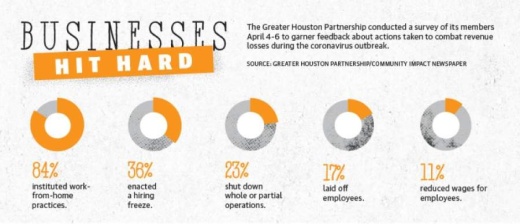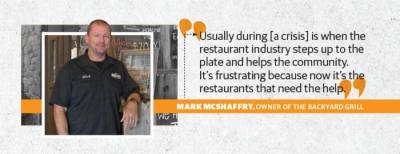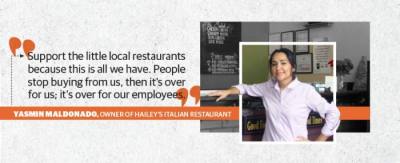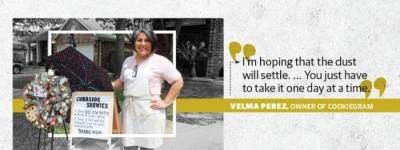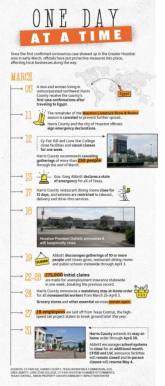McShaffry, who owns The Backyard Grill on Jones Road and co-owns Creekwood Grill on Telge Road, said some restaurant owners would be closing their doors during this time at least temporarily as they lose more money staying open than closing.
“It’s a wait-and-see game,” he said. “I know how to do hurricanes; I know how to do floods. Usually during times like that is when the restaurant industry steps up to the plate and helps the community. It’s frustrating because now it’s the restaurants that need the help.”
Business owners throughout Cy-Fair have felt the effects of the global coronavirus pandemic, which has led to the unprecedented closures of schools, churches and nonessential businesses.
County officials have increased and extended precautionary measures to help prevent the spread of the virus since the first two confirmed cases were identified in unincorporated northwest Harris County on March 5.
Harris County Judge Lina Hidalgo instituted a mandatory stay-at-home order for all nonessential workers on March 24, and it has since been extended to at least April 30.
“By staying home, we are saving lives, we are flattening the curve of the virus, and we are not overwhelming our health care system and our community as a whole,” Hidalgo said at a March 24 press conference.
While thousands of lives could be saved during the stay-at-home order, thousands of livelihoods are on the line as local businesses have been forced to close their doors and lay off employees.
Businesses hit hard
At Hailey’s Italian Restaurant on Barker Cypress Road, owner Yasmin Maldonado said she had been preparing her staff for weeks for the effects of the looming pandemic, and she was seeing sales drop even in the days leading up to Harris County’s order.
The Italian eatery continued to offer curbside pickup and delivery through DoorDash, although the restaurant had to halt dine-in services. Neighboring businesses have experienced the same drop in traffic, and Maldonado said she is concerned the return to normal sales will take longer than expected.
“We want to encourage people not to be afraid of anything, just come out here and support the little local restaurants because this is all we have,” she said. “People stop buying from us, then it’s over for us; it’s over for our employees.”
Other businesses may have trouble tracking down ingredients that are usually in higher supply.
For cottage baker Velma Perez, the slew of event cancellations due to social distancing has taken a toll on her business, CookieGram, which she runs out of her Cypress home.
“When it comes to novelty items like things that I do, they fall very low on the list of needs,” she said. “Right now everyone is scrambling for supplies and groceries, which is also affecting what I do from home if I can’t find what I need in the way of flour, eggs, butter or sugar.”
In the meantime, she is producing themed cookie decorating kits for families to pick up curbside. She said her goal is to offer something fun and recoup some of that lost revenue.
“I hope that I don’t have to close my doors. I’m hoping that the dust will settle. This is my livelihood—this is my full-time job, not just a part-time hustle,” Perez said. “You just have to take it one day at a time.”
Entrepreneurs press on
According to a survey of Greater Houston Partnership members conducted in early April, more than half of small business owners in the region said they would survive less than six months during the stay-at-home order with no federal assistance.
“Most small businesses are really suffering right now,” said Patrick Jankowski, the senior vice president of research for the GHP, in a March 31 webinar. “Small businesses by their nature tend to operate on very thin margins, and they don’t have a lot of reserves. And if they have any cash reserves, they’re usually putting it back into trying to grow the business.”
Owners of small businesses such as Jersey Bagels and The Cuppo Coffee & Tea—which have been open as brick-and-mortar shops for less than a year in Cy-Fair—elected to temporarily operate on reduced hours or with a reduced staff to cut back on expenses during economic uncertainty.
Tam Duong, who co-owns The Cuppo with her brother Sivin, said she saw about a 50% decrease in sales immediately following the county’s prohibition of dine-in services.
Duong launched a “virtual tip jar” encouraging customers to support baristas who rely on this job as their sole source of income.
“It has been affecting our business significantly,” she said. “It happened so fast. We’re adjusting on a daily basis, and everything is so uncertain.”
Other area establishments have also found creative ways to continue supporting their employees and keep their business afloat—from encouraging customers to purchase gift cards for future use to assembling take-home crafting kits, offering special discounts, and holding virtual fitness classes and music lessons.
But Leslie Martone, president of the Cy-Fair Houston Chamber of Commerce, said small businesses that are not supported by larger corporations will struggle during this time.
Federal assistance is available through the U.S. Small Business Administration via the Paycheck Protection Program, which provides eight weeks of assistance to help cover payroll, rent and other expenses at a 0.5% interest rate. The initiative is part of the $2 trillion Coronavirus Aid, Relief, and Economic Security Act—signed into law March 27.
Even with governmental assistance, Martone said she believes local business closures due to the coronavirus outbreak are inevitable.
“This is much worse than [Hurricane Harvey] and probably will be longer lasting,” she said.
A long road ahead
Many individuals have been laid off since the coronavirus made its way to Harris County and slowed business throughout Cy-Fair. Statewide over the last two weeks of March, more than 430,000 Texans filed initial claims for unemployment insurance, according to the Texas Workforce Commission.
Having seen decreased traffic since spring break, Escape Now closed its doors on Jones Road “semipermanently” March 19 as customers began canceling their sessions even before the stay-at-home order was in place for nonessential businesses.
Geraldine Roddie has owned the escape room business with her husband, Mike, since May 2016 and said she was hopeful about eventually reopening.
As of April 7, Roddie said she had applied for the SBA Economic Injury Disaster Loan program but had not heard back, and while the business is paying 50% of rent costs during the closure, the landlord expects to see everything owed when or if Escape Now reopens.
“At the end of the day, we can’t just keep paying rent when there’s no income,” she said. “I feel bad for the employees because I know some of them are basically paying bills for their families, but I just don’t know what else to do. Laying them off means they can go get unemployment, and so hopefully that helps.”
Ultimately, Martone said she is not concerned about the future of business in Cy-Fair because she believes residents will continue to support their neighborhood businesses.
“I know there will be some hardships and some challenges ahead, but I know that we will come back from this,” she said.
However, in the weeks following countywide policies, some business owners said the light at the end of the tunnel seems distant.
Jenn Lindsay said the event venue she manages—Lindsay Lakes off Mueschke Road—typically hosts at least 100 events annually, but meeting that threshold is unlikely for 2020 as the pandemic forces couples to postpone their weddings.
“Obviously all vendors have been hit very hard—that includes our waitstaff, our cooks, our bartender and everyone it takes to make a wedding go off as planned,” Lindsay said.
The future is uncertain for many as coronavirus case confirmations continue to rise in Harris County. McShaffry said his staff and his customers are ready to see the community get back to business as usual again.
“Most people are actually coming in [to pick up food],” he said. “I think they kind of want a little bit of normalcy, to talk to people and see how things are going.”




